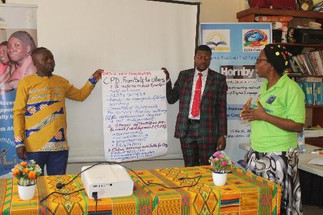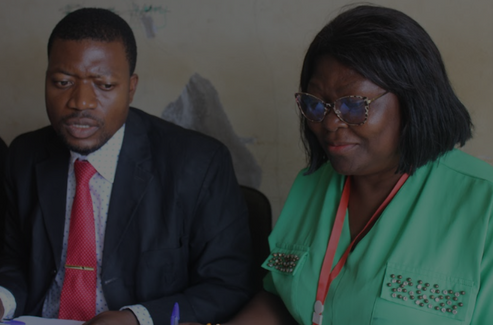In need of rebranding? Sneak peek of the workshop for cooperating teachers | Anestin Chi
- Open Dreams

- Apr 25, 2024
- 4 min read
Summary
From 13 to 15 March 2024, seventeen cooperating teachers in the Mfoundi Division took part in a training entitled Teaching Practice Mentoring: Workshop for Cooperating Teachers. The workshop, which was supported by a grant from the A.S. Hornby Educational Trust, was run in partnership with Open Dreams and IELTA-Cameroon under the supervision of the Regional Inspectorate for Bilingualism, Centre Region.
Background
The workshop idea stemmed from the cognition that teaching practice lies at the heart of initial teacher training as it enables student-teachers to gain practical professional experience in real classrooms under the guidance and support of cooperating teachers.
Yet, these cooperating teachers are not always sufficiently trained to handle the delicate responsibilities that come with guiding and helping student-teachers to effectively transition into the profession.
Workshop Activities
The workshop, which was presided over by the Country Lead, British Council Cameroon (a highly esteemed partner of the A.S. Hornby Educational Trust) and the Regional Inspector Coordinator for Bilingualism lasted three days.

Day 1 was marked by the official opening ceremony during which the Project Lead, Anestin Chi, presented the rationale for the workshop. Thereafter, the Regional Inspector Coordinator, Mme BELINGA, encouraged selected participants to make the most of this training. She also expressed the wish to see this initiative extended to other regions of the country.
Left: Project Lead, Anestin Chi, delivering project keynote.
Right: Inspector Coordinator BIL, Centre addressing workshop attendees.
Finally, the British Council Country Lead, Mme Caroline Ndifor, presented the A.S. Hornby Educational Trust and its work in the promotion of English Language teaching especially in the Global South as well as professional development opportunities for teachers offered by the British Council and its partners.

After the official launch, workshop participants dived into serious business with four seasoned sessions: first, a getting-to-know session, which enabled participants to interact with one another and share expectations from the workshop.

Next, there was a session on cooperating teachers’ roles and responsibilities, which introduced participants to different mentoring roles and the qualities of an effective mentor.

Thereafter, participants learned about different mentoring approaches and tools and discussed applicability in the teaching practice context.

Finally, participants reflected on the learnings of the day before going home at 15:45pm.

Day 2 sessions started at 9:30 am with a recall session to help refresh the minds of participants and ascertain mastery of previous learning.
Participants engaged in recall session led by Robert
Next, participants were introduced to the different dimensions cooperating teachers need to consider in teaching practice mentoring as covered by Hudson’s (2004) five factor model of mentoring.
Participants actively engaged in session led by Anestin
After that, participants were introduced to British Council's continuous professional development framework and guided to reflect on their professional growth, which is key in mentoring others.
Participants actively engaged in session led by Fadidac
After the lunch break, participants were guided to explore and practice applications of co-planning and co-teaching models.
Participants actively engaged in micro-teaching (co-planning and co-teaching) – session moderated by Anestin
Finally, in groups, participants reflected on the day’s learning and completed exit tickets before retiring home at 16:10pm.

Day 3, just like day 2, was made up of five sessions. First, participants started off with a recall to enable them to refresh their minds about the previous day's learning.
Participants engaged in a recall session led by Robert Kenfack
Second, participants were introduced to the art of managing post-teaching conferences. They watched good and bad models of post-observation conferences and analyzed them.
Participants actively engaged in a session led by Fadidac
Third, participants were introduced to effective strategies for managing difficult conversations with student-teacher mentees on teaching practice.
Participants actively engaged in session led by Anestin
In the fourth session, after the lunch break, participants were supported to engage in role-playing post-teaching conferences to help them to master the art of giving constructive feedback.
Participants actively engaged in role-playing post-teaching conferences - session moderated by Anestin
Finally, participants reflected on the learning of the day and completed end-of-workshop evaluation forms.

Feedback from workshop attendees
Workshop attendees were generally satisfied with the conduct and content of the workshop which they described as ‟insightful”, ‟impactful” and ‟timely”. Participants reported that the workshop created ‟greater awareness of the expectations of teaching practice and their roles as cooperating teachers”. They mentioned that the workshop was ‟hugely beneficial” to them because they had never received any training or document to help them fully assume the responsibilities of a cooperating teacher.
Oftentimes, they are assigned student-teachers with no prior notice. In rare cases, they receive letters which simply state assigned student-teachers' names and start and end dates of teaching practice with ‟no mention of what is expected of them as cooperating teachers, their roles or even how the mentoring should be conducted”. At the end of the workshop, participants attested that they ‟became more aware of the expectations of teaching practice mentoring”, ‟understood the roles they are expected to play during teaching practice” and are thus ‟likely to be more effective henceforth”.
Workshop attendees decried the‟ lack of synergy of action between teacher training supervisors, inspectors and cooperating teachers” in the mentoring of student-teachers during teaching practice. They expressed the wish to ‟have a workshop not just for cooperating teachers but with all the stakeholders taking part in teaching practice supervision involved”.
Appreciation from the project team
The project team is grateful to the A.S. Hornby Educational Trust for supporting this workshop with a grant and to the Regional Delegation of the Ministry of Secondary Education for readily supporting this initiative and mobilizing cooperating teachers to participate.
We thank the regional inspectorate for Bilingualism for closely overseeing the success of the workshop, which was not just a capacity-building opportunity for the cooperating teachers but also a learning opportunity for the team of facilitators.
The Project Lead,
Anestin Chi













































Comments